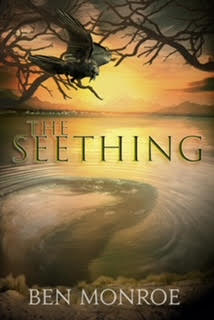How to stand out as an author online

We’re constantly bombarded with so much information in our daily lives, it can be difficult to stand out as an author trying to establish an online presence. The trick? Keep it simple.
by Ben Monroe
 We live in an age of noise, inundated with “content” in every aspect of our lives. Take a moment to think about the last time you took a walk, went for a drive, or even just did chores or errands, and how much extraneous information you were bombarded with along the way.
We live in an age of noise, inundated with “content” in every aspect of our lives. Take a moment to think about the last time you took a walk, went for a drive, or even just did chores or errands, and how much extraneous information you were bombarded with along the way.
And somehow, in marketing our books, indie authors are supposed to rise above all this noise to make our presences known. It’s a daunting battle, but there are a few things we can do to try and get our work in front of prospective readers.
First and foremost is to have a presence of some sort online. And at the very least, your online presence must consist of two things: a website and some sort of social media. It’s also important to realize that the use of each of these two facets must be done differently.
Books & Buzz Magazine is where writing pros spill their secrets! Subscribe now for free
Think of social media as sort of a perpetual cocktail party. Use your presence there to let people see the “casual you.” Be yourself. Be funny. Don’t stress typos. Most importantly, use your social media channel as a conversation. Don’t simply blast out updates about your own writing, successes, and setbacks. Engage with the community. Follow fellow authors and comment on their posts. Let your potential readers see your authentic self and become interested in you as a person as well as a writer.
Once you’ve engaged your audience via social media sites, you need to have a place for them to come and find out more about you and your work. This is where your website comes in. A website is still critical to your success in promoting your work as an author. It’s a one-stop place for potential readers to come and find out more about you. You can promote your works as well as yourself there. However, there are a few things to keep in mind about a website.
Think of social media as sort of a perpetual cocktail party. Be yourself. Be funny. Don’t stress typos.
Too much is too much. Keep the information brief and easy to find. Make it easy for your readers to find:
- Biographical information. Whatever your author bio is, put it on your site. Maybe expand it a little from what you have in your books, but still keep it short. Stephen King is the most popular author of our time, and his biography’s never more than a paragraph. Yours doesn’t need to be any longer than that.
- Contact information. Have a dedicated e-mail address where people can contact you (maybe a different one from your main “friends and family” address), as well as links to all your social sites.
- “Media” and appearances information. Links to anywhere outside your site where readers can learn more about you. Podcasts, in-person appearances, articles, etc.
- Book list. Of course, you want to have an updated publication list on your blog. If you want to link to places where readers can buy your books directly, do so. But if your books are available in more than one place, it’s best just to list the title, publication date, publisher, and a brief description.
Remember that in the current world, people may be reading your site on a phone. Keep the content short, tight, and easy to navigate.
A website is only valuable if it’s current. If the information is out of date or the links are broken, readers will assume it’s been abandoned. Conventional wisdom is that a website is usually out of date visually in about eighteen to thirty months. You might consider reorganizing, and redesigning your site every couple of years. Even if the content stays mostly the same, giving it a visual polish helps keep it looking fresh.
Keeping the content fresh is often as simple as just updating your publication, media, and appearances section every time you have new things to post in those sections.
And while they’re often seen as a bit old school by now, you might consider setting up a blog on your site. Even if it’s only updated semi-occasionally, it’s worth considering. One benefit of a blog that many authors never consider is that you can link it directly to your Amazon and Goodreads author pages. Every time you update your blog, your posts can auto-populate directly to Amazon and Goodreads. And now people who’ve read your book and go to your pages on those sites to see what else you’ve written see new, fresh content from you.
While setting up a website may seem daunting, there are plenty of ways to do it easily for the less tech savvy. I’m not a programmer at all, and have no interest in learning how to build a website from the ground up. So I chose my hosting service based on how it was template driven. I picked a design I liked, filled in the content, and organized the pages the way I wanted. Done.
This is a big topic, and more than can be covered in a short essay like this. But I hope at least this has given you some ideas on how to get started, and the impetus to put yourself out there and try to rise above the chatter.
Ben Monroe has spent most of his life in Northern California, where he lives in the East Bay Area with his wife and two children. He is the author of In the Belly of the Beast and Other Tales of Cthulhu Wars, The Seething, the graphic novel Planet Apocalypse, and short stories in several anthologies. When not writing about slimy lake monsters, cosmic horrors, or other malevolent entities, Ben spends time with his family, reads a lot, works a perfectly normal day job, builds models of classic monsters, and enjoys hiking and running in the East Bay hills.
You can find more information about him and his work at his website. There, you’ll also find links to his social media, upcoming appearances, and more.